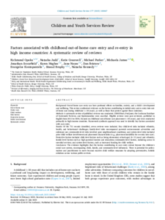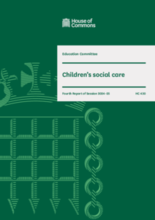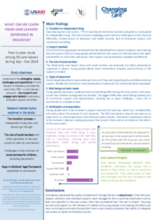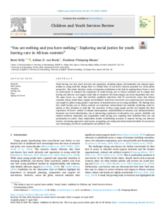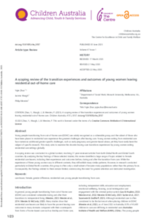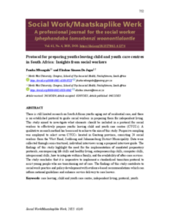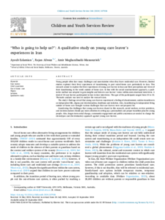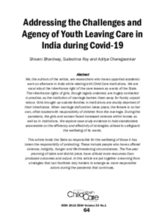Displaying 21 - 30 of 991
Out-of-home care entry can have profound effects on families, society, and a child’s development and wellbeing. This review synthesised evidence on the factors contributing to initial entry and re-entry into out-of-home care during childhood (<18 years), as well as those that protect against these outcomes.
This report makes a series of recommendations on issues affecting all types of care, including foster care, adoption, kinship care, children’s homes, and support for disabled children in the UK.
Care-experienced youth worldwide face housing instability, unemployment, psychological distress, and legal vulnerability when leaving out-of-home care, highlighting the need for coordinated transitional support. This paper proposes a Global Framework for Transitional Support that integrates stable housing, mental health care, education and workforce pathways, and legal empowerment through an adaptable, trauma-informed model designed for diverse cultural and resource contexts.
This one-page English-language synopsis of the full report in Romanian titled, “Ce putem învăța de la tinerii cu experiență trăită în sistemul de îngrijire din Republica Moldova?” (What can we learn from young people with lived experience in Moldova's care system?), offers a compelling peer-to-peer perspective from 56 young people who transitioned out of Moldova’s care system.
Acest raport prezintă rezultatele unui studiu participativ realizat de rețeaua Youth & Experience (Y&E), fondată de tineri cu experiență trăită în sistemul de îngrijire din Republica Moldova, realizat în perioada septembrie - decembrie 2024 cu participarea a 56 de tineri.
This article uses Nancy Fraser’s social justice framework to examine the experiences of youth leaving care in Ghana, South Africa, Uganda, and Zimbabwe, drawing on interviews with 45 care-leavers conducted by peer researchers. Findings reveal how intersecting injustices—such as stigma, exclusion, and lack of resources—undermine their transition to adulthood, underscoring the need for stronger aftercare services, recognition of diverse identities, and greater youth participation in shaping policy and support.
This scoping review analyzes 31 studies on young women leaving residential care worldwide, highlighting their unique gender-specific challenges such as early pregnancy and gender-based violence. Despite recurring patterns across contexts, research on this group remains limited, especially as they are often treated as a subset of broader studies, pointing to the need for more focused investigation.
There is still limited research on South African youths aging out of residential care, and there is no established protocol to guide social workers in preparing them for independent living. This study aimed to investigate what elements should be included in a protocol for social workers to effectively prepare youths leaving child and youth care centres (CYCCs).
This research aimed to explore the lived experiences of young care leavers in Iran and their perceptions and views of their transitioning to the world outside of home care.
This article holds the State as responsible for the wellbeing of those it has taken the responsibility of protecting. These include people who have suffered violence, indignity, hunger and life-threatening circumstances. The five-year planning of state and district plans have utilised more resources than produced outcomes and output. In this article we put together a learning from strategies that can facilitate duty holders to emerge as more responsible actors during the pandemic that continues.

